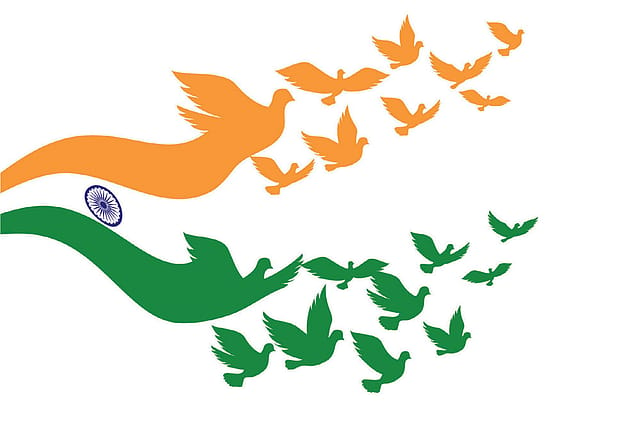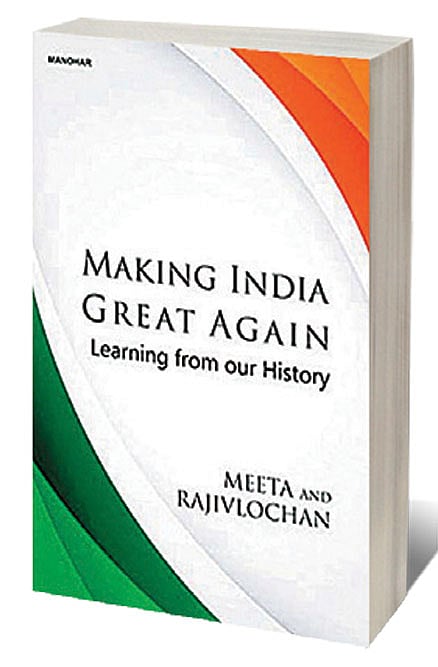Past Perfect

A NEW RANGE OF books have begun to bloom in the landscape of non-fiction in India. A sub-genre, which is fast gaining traction and popularity, can, for want of a better term, be considered as comprising ‘national self-help books’. Early arrivals included Nandan Nilekani’s Imagining India and Getting India Back on Track (edited by Bibek Debroy et al). Joining this group is Meeta and Rajiv Lochan’s Making India Great Again: Learning from Our History.
A rather exhaustive introduction—almost one-fifth of the book—wrestles with the problem: Why did India succumb to colonialism? It then proceeds to lay out the core philosophy of the book: India is rich by default, not by design. The more obvious answer is lack of state support to business. The second and less apparent reason advanced is the inability of Indians to systematise information. It is the contention of the authors that both factors continue to cripple the country and prevent it from becoming great.
A clutch of interesting examples is offered to reinforce the argument. For instance, Indian rulers never paid the soldier regularly, in contrast to their European counterparts. The pièce de résistance relates to the Great Mughal Akbar. A chapter sub-heading dramatically states: ‘Akbar negotiates with Portuguese for free passes for his wife.’ Not only the merchants, even the emperor was helpless in the face of systems set up by the Europeans.
The initial chapters would appeal more to the scholarly inclined. A seductive new argument makes its appearance: pre-Independence, Indians led a serendipitous existence. Ease of living rendered innovation and systematisation of information unnecessary. Historical evidence is adduced. Of more interest to the layreader are the success stories cited post-Independence: whether individual (Dharampal Gulati and MDH masalas and Brij Mohan Munjal, founder of Hero Cycles) or collective (the Election Commission, the Indian Space Research Organisation and the House of the Tatas). However, these are isolated examples which bucked the trend.
Openomics 2026: Continuity and Conviction
06 Feb 2026 - Vol 04 | Issue 57
The performance state at its peak
The authors next focus their lens on three important sectors: banking, manufacturing and the mathematical sciences. ‘Bankers Extraordinaire: House of Jagat Seth’ traces the extraordinary rise of Manikchand, his fruitful association with Murshid Quli Khan and his contributions to modernising the banking system. The equally precipitous fall of the House under Manikchand’s successor, Mehtab Rai, is well delineated and lessons drawn. In the manufacturing sector the focus is on wootz steel, treasured for its sharpness, hardness and malleability, in ancient India. Scientists are still trying to unlock the mysteries of its manufacture, which would have been clear if systematic records had been kept. The somewhat pejoratively titled ‘Land of the Lotus Eaters’ focuses on Indian mathematicians. It correctly argues that mathematical knowledge in India did not jump across disciplines to act as a force multiplier for science and technology in general.
The underlying thread is how the lack of proper harnessing of information held the country back. The authors have made a compelling case for the country to systematise information collection, collation and analytics so that time is not lost on reinventing the wheel.
The last two chapters are prescriptive in nature. A six-point plan of action, with implementable suggestions, for instance, repeal of archaic laws, should form an agenda for our decision-makers.
While cogently argued, the book falls short on some counts. For one, the cherrypicking of examples leads to some needless repetition. Also, the prescriptive portion, containing some seminal suggestions, could have done with elaboration. But the most serious shortcoming relates to the fact that the book omits mention of some important contemporaneous developments, which have an important bearing on the book’s subject. Aadhaar and Big Data mining get only a passing mention, while there is deafening silence on Digital India, Ayushman Bharat, the Goods and Services Tax and other germane issues. Might a sequel be on its way? Overall, a commendable effort, which falls short of the ‘great’ category.

